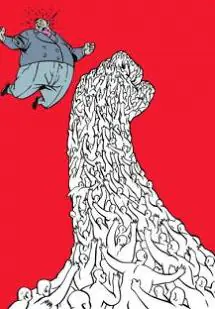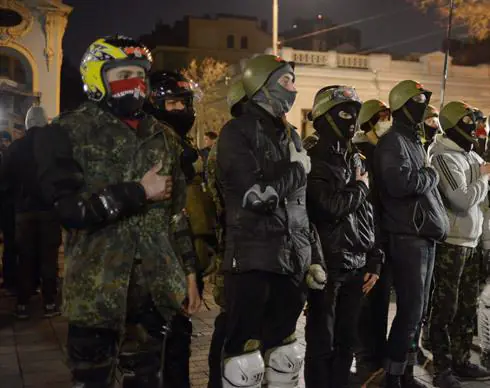The analysis of any concept must begin with a definition of terms. The meaning of the name is closely related to the implementation of the phenomenon in society.
What does "radical" mean?

This word is known from the school curriculum. Everyone knows that this term refers to a root. Removing it is a qualitative change. By analogy with the question of who are radicals, the answer is: people striving for change. In fact, everyone wants some changes in politics. Radicals differ from others in their methods of achieving goals. They call for action similar to root extraction, rapid and irreversible. This term is also used in chemistry. A free radical is an element that is not associated with others. The analogy in politics is an independent, independent game, an unwillingness to maintain connections with other forces. Characteristic of radicals is any lack of tolerance. Tolerating dissent is not their method.
Radical principles

Examples of radical actions
This trend exists in almost any society. To better understand who radicals are, we can consider a striking example. During the well-known events in Ukraine, political forces showed themselves quite openly. Thus, the radical fighters of the Right Sector did not just act decisively. At a time when other protesters were ready to compromise with the authorities, they declared their intention to bring the events to a victorious end.

The danger of radical views
This movement is not limited to a demonstrative lack of desire to take dissent into account. When discussing who radicals are, we should talk about their attitude to armed struggle. She is welcome, even more so. Radicals consider armed resistance to power (opposition, opponents, etc.) the most effective method of conversation. To achieve the goal, all means are good. A machine gun or a fist, a rocket or a knife - everything is applicable. The opponent must not be persuaded, but coerced.

Russian radicals
In a multi-ethnic country, extreme views always find suitable soil. Radical Islamists operate using religiously motivated armed violence. The basis of Wachabism was a broader Islamic movement - Salafism. Russian radicals, in fact, are part of this global trend. His fans are fighting for the return of all Muslims to the monotheism that their ancestors had. All other movements of this religion that arose later must cease to exist. Thus, the activities of the Bachabites lead to the emergence of an atmosphere of religious intolerance in society. It should be noted that there is no unanimity in the movement itself. Some groups deny armed struggle, while others consider it an extreme method. But the essence remains - their views do not recognize the existence of dissent, in this case - a different understanding of faith. Radical organizations did not immediately begin to form their own movement. It all started with small communities (jamaat).

The basis of radical organizations
One of the main problems of all political movements is the recruitment of adherents, that is, adherents. Radicals attract their supporters using various methods. Thus, Islamic movements often attract people with the most sincere help. Representatives of such movements conduct missionary activities. They are engaged in explaining their views, including who the radicals are, what they are fighting for, and also providing humanitarian aid to those most in need. It turns out that people who live on the brink of poverty and who are dissatisfied with the authorities are at risk of joining the radicals. In developing countries, the selection of “agents” is carried out by various funds. Mostly it goes the unofficial route. Unfortunately, the development and financing of such movements often has goals that are not at all ideological. For example, Islamic radicalism in Russia was created with a completely understandable goal: to undermine the country’s economy in the direction of the Caucasus.
The level of development of modern society allows us to abandon the methods of extreme radicalism. More often, young people are attracted to it, unable to objectively assess the balance of power. When joining the ranks of radicals, it is recommended to be well aware that bloody riots are not at all the best way to achieve progress. They are permissible only when there is no other way. And, as you know, the road is built by those who walk themselves. What to use: a word or a machine gun, it’s up to him – the creator of his life – to choose!

1. A supporter of extreme, decisive actions and views.
2. Supporter of radicalism (2 digits). — There is a very close connection between the ideas and programs of our radicals and the interests of the petty bourgeoisie. Lenin, What are “friends of the people” and how do they fight against the Social Democrats?
[From lat. radicalis - indigenous]
1. Mat. The sign (√) denotes the action of root extraction, as well as the result of root extraction.
2. Chem. A stable group of atoms in a molecule that passes without change from one chemical compound to another.
[From lat. radicalis - indigenous]
Source (printed version): Dictionary of the Russian language: In 4 volumes / RAS, Institute of Linguistics. research; Ed. A. P. Evgenieva. — 4th ed., erased. - M.: Rus. language; Polygraph resources, 1999; (electronic version): Fundamental electronic library
- Radical (literally: “root” from the Latin radix - “root”):
RADIKA'L 1 , A, m. [from Latin. radicalis - indigenous]. 1. A supporter of left-bourgeois political parties who allows for more or less significant bourgeois-democratic reforms within the framework of a capitalist state (political). 2. trans. Supporter of extreme, decisive actions, events, views (book). R. in science.
RADIKA'L 2 , A, m. [from Latin. radicalis - indigenous]. 1. The sign <—√>, denoting the extraction of a root from a number or algebraic expression, which appears under the line (mat.). 2. A group of atoms that acts in chemical processes as an element that passes without change from one compound to another (chemical).
Source: “Explanatory Dictionary of the Russian Language” edited by D. N. Ushakov (1935-1940); (electronic version): Fundamental electronic library
radical I
1. math. sign of the mathematical action of extracting a root, also the result of such an action
2. chem. a stable group of atoms in a molecule that passes without change from one chemical compound to another
3. linguistic same as hieroglyphic key; graphic element or simple character of Chinese writing, of which complex characters are composed
radical II
1. supporter of extreme views and decisive action in any area
2. watered member of a party advocating a radical change in the existing social order and political system
Making the Word Map better together

Hello! My name is Lampobot, I am a computer program that helps you make Word Maps. I can count perfectly, but I still don’t understand very well how your world works. Help me figure it out!
Thank you! Someday I, too, will learn to distinguish the meanings of words.
In what sense is the adjective used? right in the excerpt:
I dropped it there yesterday right shoe and decided that from now on I would always sit barefoot.
RADICAL - (Latin, radix, radicis root). 1) A politician seeking radical changes in the governance of the country. 2) English socialists are also called radicals. 3) In organic chemistry, complex substances that can combine with other substances... ... Dictionary of foreign words of the Russian language
RADICAL - a mathematical sign (modified Latin r), which denotes the action of extracting the root, as well as the result of extracting the root, i.e. a number of the form RADICALE (from the Latin radix root) a supporter of radical, decisive measures ... Big Encyclopedic Dictionary
RADICAL - RADIKAL, radical, husband. (from Latin radicalis root). 1. Supporter of left-bourgeois political parties, allowing for more or less significant bourgeois-democratic reforms within the framework of the capitalist state (political). 2. translation ... Ushakov's Explanatory Dictionary
radical - 1. RADICAL, a; m. [from lat. radicalis indigenous] 1. A supporter of extreme, decisive views and actions. 2. Supporter of radicalism (2 digits). 2. RADICAL, a; m. [from lat. radicalis radical] 1. Math. Sign indicating root extraction; result... ... Encyclopedic Dictionary
radical - sign of root extraction Dictionary of Russian synonyms. radical noun, number of synonyms: 14 • alkyl (1) • allyl... Dictionary of synonyms
RADICAL - (from the Latin radix root), a supporter of radical, decisive measures, actions, programs ... Modern encyclopedia
RADICAL — RADICALE, a mathematical sign (modified Latin r), which denotes the action of extracting a root, as well as the result of extracting a root, i.e. number of the form ... Modern encyclopedia
Radical - supporter of radical, decisive measures, actions, programs ... Historical Dictionary
RADICAL - (notation C), an expression used to denote the root of a number. The expression represents the nth root of the number x, where n is the exponent of the root, ah is the radical expression. The CUBIC ROOT of ten is written as a radical... ... Scientific and Technical Encyclopedic Dictionary
RADICAL 1 — RADICAL 1, a, m. Ozhegov’s Explanatory Dictionary. S.I. Ozhegov, N.Yu. Shvedova. 1949 1992 ... Ozhegov's Explanatory Dictionary
RADICAL 2 — RADICAL 2, a, m. Ozhegov’s Explanatory Dictionary. S.I. Ozhegov, N.Yu. Shvedova. 1949 1992 ... Ozhegov's Explanatory Dictionary



